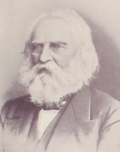The Discoverer Of The North Cape
by Henry Wadsworth Longfellow
A leaf from King Alfred's orosius.
Othere, the old sea-captain,
Who dwelt in Helgoland,
To King Alfred, the Lover of Truth,
Brought a snow-white walrus-tooth,
Which he held in his brown right hand.
His figure was tall and stately,
Like a boy's his eye appeared;
His hair was yellow as hay,
But threads of a silvery grey
Gleamed in his tawny beard.
Hearty and hale was Othere,
His cheek had the colour of oak;
With a kind of laugh in his speech,
Like the sea-tide on a beach,
As unto the king he spoke.
And Alfred, King of the Saxons,
Had a book upon his knees,
And wrote down the wondrous tale
Of him who was first to sail
Into the Arctic seas.
"So far I live to the northward,
No man lives north of me;
To the east are wild mountain-chains,
And beyond them meres and plains;
To the westward all is sea.
"So far I live to the northward,
From the harbour of Skeringes-hale,
If you only sailed by day,
With a fair wind all the way,
More than a month would you sail.
"I own six hundred reindeer,
With sheep and swine beside;
I have tribute from the Finns,
Whalebone and reindeer-skins,
And ropes of walrus-hide.
"I ploughed the land with horses,
But my heart was ill at ease,
For the old seafaring men
Came to me now and then,
With their sagas of the seas; --
"Of Iceland and of Greenland,
And the stormy Hebrides,
And the undiscovered deep; --
I could not eat nor sleep
For thinking of those seas.
"To the northward stretched the desert,
How far I fain would know;
So at last I sallied forth,
And three days sailed due north,
As far as the whale-ships go.
"To the west of me was the ocean,
To the right the desolate shore,
But I did not slacken sail
For the walrus or the whale,
Till after three days more.
"The days grew longer and longer,
Till they became as one,
And southward through the haze
I saw the sullen blaze
Of the red midnight sun.
"And then uprose before me,
Upon the water's edge,
The huge and haggard shape
Of that unknown North Cape,
Whose form is like a wedge.
"The sea was rough and stormy,
The tempest howled and wailed,
And the sea-fog, like a ghost,
Haunted that dreary coast,
But onward still I sailed.
Four days I steered to eastward,
Four days without a night:
Round in a fiery ring
Went the great sun, O King,
With red and lurid light.
Here Alfred, King of the Saxons,
Ceased writing for a while;
And raised his eyes from his book,
With a strange and puzzled look,
And an incredulous smile.
But Othere, the old sea-captain,
He neither paused nor stirred,
Till the King listened, and then
Once more took up his pen,
And wrote down every word.
And now the land,
said Othere,
"Bent southward suddenly,
And I followed the curving shore,
And ever southward bore
Into a nameless sea.
"And there we hunted the walrus,
The narwhale, and the seal;
Ha! 'twas a noble game!
And like the lightning's flame
Flew our harpoons of steel.
There were six of us all together,
Norsemen of Helgoland;
In two days and no more
We killed of them threescore,
And dragged them to the strand!
Here Alfred the Truth-Tellers,
Suddenly closed his book,
And lifted his blue eyes,
With doubt and strange surmise
Depicted in their look.
And Othere the old sea-captain
Stared at him wild and weird,
Then smiled, till his shining teeth
Gleamed white from underneath
His tawny, quivering beard.
And to the King of the Saxons,
In witness of the truth,
Raising his noble head,
He stretched his brown hand, and said,Behold this walrus-tooth!
Source:
Longfellow's Poetical WorksCopyright 1893
Henry Frowde, London
